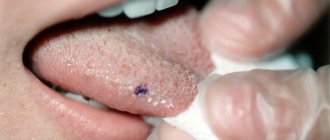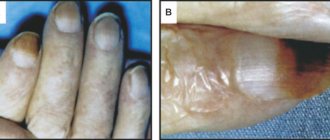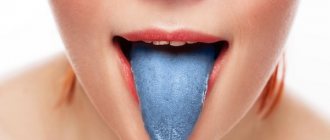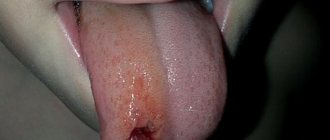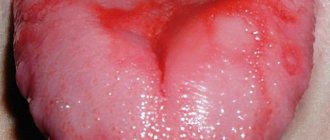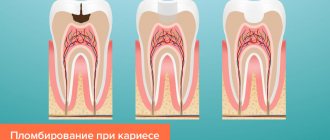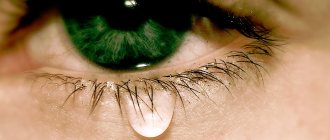Fresh or cooked pineapple contains many trace elements and vitamins, its consumption has a positive effect on health. The fruit can be eaten raw, canned, used for preparing meat, confectionery, and juices. But sometimes after fresh pineapple, especially eaten in large quantities, the tongue and lips sting. Let's figure out why it stings in the mouth.
Pineapple allergy: causes
Pineapple contains vitamins C, A, B, potassium, iron, manganese, sodium, phosphorus. This is a low-calorie fruit, rich in coarse fiber, so it is often used for weight loss. In addition, it contains bromelain, an enzyme that promotes the digestion of animal proteins. Moderate consumption of pineapple has a beneficial effect on intestinal motility, the functioning of the cardiovascular system, and the removal of excess fluid and toxins from the body.
However, despite the health benefits, eating this fruit can lead to unpleasant symptoms of an allergic reaction. What causes a pineapple allergy?
- Exposure to chemical compounds. Like most exotic fruits, pineapples undergo additional processing to extend their shelf life. In addition, the fruits are often harvested green. Ripening occurs in special chambers where the fruit is treated with chemicals. This can lead to allergies.
- Heredity. The tendency to food intolerance can be inherited if close relatives of the allergic person suffer from the same problem. For example, if one parent has a fruit intolerance, the probability of passing on the allergy predisposition to the child is about 30%.
- Allergy to other exotic fruits. If a person has previously had an atypical reaction to citrus fruits, kiwi, mango and other tropical fruits, it is recommended to replace them with local fruits (high in vitamin C, the presence of natural dyes).
In addition to the above reasons, allergies can develop as a result of living in an environmentally polluted area, smoking, general exhaustion of the body, or weakened immunity.
Composition of pineapple
Pineapple is a perennial herbaceous plant that grows in all tropical countries of the world. The culture has many varieties. The chemical composition of pineapple includes various beneficial compounds, trace elements and vitamins. The fruit, which is consumed as a fruit, is considered a valuable food product and has the following properties:
- 86% consists of water.
- Contains many simple sugars, mainly sucrose.
- Includes organic acids, mainly citric and ascorbic. And this is a possible reason why your tongue stings after eating pineapple.
- Vitamins A, B1, B2, B6, PP are present.
- Minerals are represented by potassium, calcium, magnesium, iron, copper, zinc, manganese, iodine.
- The composition also contains bromelain, a complex of enzymes that break down proteins. This active substance gives its name to a whole family of plants - Bromeliads. Pineapple also belongs to this family of plants.
The large amount of water in the fruit makes it low-calorie and useful for diets. The natural sugars contained in the fruit are healthier than beet or cane sugar consumed daily. The presence of vitamin C makes the fruit useful for maintaining immunity. In addition, ascorbic acid is an antioxidant, and according to recent research, it slows down the development of cancer.
Other vitamins and microelements are useful both for the whole body and for the cardiovascular system in particular. And potassium salts help remove excess water from the body, which in turn helps to reduce weight.
Bromelain promotes the digestion and absorption of protein foods, has an anti-inflammatory effect, counteracts thrombosis and high blood clotting. Because of the bromelain, pineapple and natural pineapple juice are excellent ingredients for marinating meat. After such a marinade, even the toughest meat becomes soft.
We recommend that you read the Calorie content of pineapple
Due to these properties, pineapple is often used to remove calluses. And cosmetologists use the fruit to make masks for the face and décolleté. The effect of such masks is as follows:
- moisturize and tone;
- nourish the upper and middle layers of the skin with vitamins and nutrients;
- exfoliate the surface layer of the epithelium;
- stimulate the growth of new cells;
- relieve inflammation and swelling;
- help in the fight against acne;
- smooth out wrinkles and refresh the skin.
The fruit is also used in other cosmetics.
Pineapple allergy: symptoms
If a person has a tendency to allergic reactions to other exotic fruits, he should definitely know how an allergy to pineapple manifests itself. This will help you react in time to the appearance of suspicious symptoms, prevent the development of health-threatening conditions and begin appropriate treatment.
An allergic reaction to pineapple can be represented by one or more disorders:
- From the gastrointestinal tract: nausea, vomiting, bloating and abdominal pain, indigestion.
- From the mucous membranes: swelling, tingling and itching of the mucous membranes (for example, an allergy to pineapple is often localized on the tongue, lips and corners of the mouth). Cough, lacrimation, and allergic rhinitis may also develop. Of particular danger is the possibility of developing laryngeal edema, since this allergy symptom can lead to suffocation.
- From the skin: rash, redness, swelling, itching.
- Sometimes dizziness and loss of consciousness, chills and increased body temperature, and the development of anaphylactic shock may occur.
How to reduce the burning sensation
Let's figure out what to do if your tongue burns after eating pineapple. Although the discomfort goes away on its own over time, you can speed up the process a little. The following will help:
- rinse your mouth with water;
- eat a piece of butter;
- drink a few sips of milk.
To prevent a tingling sensation in your mouth from pineapples, you need to follow the following rules when purchasing and eating the fruit:
- The lips and tongue are corroded by the large presence of acids and bromelain, the highest concentration of which is observed in unripe fruits. To select a ripe fruit, you need to press on it. It should feel elastic under your fingers, not hard. The color of ripe fruit should be brownish, golden or straw-colored with a red or orange tint, but not green or yellow.
- Bromelain is concentrated in the center of the fruit; it must be removed and not used for food. The peel contains a lot of enzyme; it must be removed without fail, and not cut into slices along with it.
- You need to eat pineapple in small portions to reduce the amount of negative substances in your mouth at a time.
- If the oral mucosa is sensitive to even a small amount of pineapple, then the fruit should not be eaten raw. You can cook it as a main dish or add it to others. Heating and combining with other ingredients will eliminate the likelihood of unpleasant sensations. Chili pepper is especially helpful in neutralizing bromelain.
- If there is no desire or opportunity to cook pineapple, then in any store you can find canned fruit that 100% does not cause burns to the mucous membrane.
- Proper cleaning of the fruit will help reduce the amount of bromelain when consumed. To get to the edible part, first peel the pineapple, being careful not to let it touch the flesh, as the peel contains a lot of enzyme. The eyes are cut out and the middle, which also contains the enzyme, is removed. The resulting pulp is cut into pieces.
We recommend that you read St. John's wort and blood pressure
Following the recommendations will help you eat tasty and healthy pineapples without pain.
Allergy to pineapples: treatment
The best option is complex therapy. It usually includes taking antihistamines and decongestants, treating the skin with anti-inflammatory creams and ointments, and removing allergens from the body using sorbents.
In order for allergy treatment to be as effective as possible, it is advisable to exclude certain foods from the diet: sea fish and seafood, cow's milk, red fruits and vegetables, nuts, citrus fruits, yeast, fermented cheeses.
To reduce skin allergy symptoms, you can use La Cree cream for sensitive skin. It fights skin hyperemia, itching and rashes. The product contains safe natural ingredients: string, walnut and violet extracts, panthenol, bisabolol and avocado oil. Due to the absence of hormones in the cream, it can be used for a long time - even for children from birth and pregnant women.
Why a healthy fruit becomes dangerous
Pineapple contains a large amount of fruit acids, which, when they get on the oral mucosa, can cause discomfort.
You can especially often encounter this problem if you eat fruits that have not reached the required level of ripeness. Pineapple contains a large amount of the enzyme bromelain, the action of which is aimed at dissolving proteins and accelerating blood flow, so if you eat a lot of fruit, there is a possibility of a burn on the oral mucosa.
The human body is made of protein, so pineapple and pineapple juice try to “digest” it. This is the main reason why pineapple stings the tongue, causing ulcers to form on the lips of those who overdo it with eating such an interesting fruit. This is where the expression “pineapple eats us when we eat it” comes from, because the fruit really eats away the mucous membrane, but this is not dangerous for the body.
Clinical researches
Clinical studies have proven the effectiveness, safety and tolerability of the products. The products are suitable for daily care of children's skin with mild to moderate forms of atopic dermatitis and during remission, accompanied by a decrease in the quality of life of patients.
Cream for sensitive skin reduces itching and irritation, relieves redness of the skin, moisturizes and gently cares for it.
Sources:
- Kamasheva G.R., Khakimova R.F. Valiullina S.A., Methods for assessing the severity of atopic dermatitis in young children, Dermatology journal, 2010
- Kovyazina N.A., Fedosimova N.A., Illek Ya. Yu. Diagnosis of atopic dermatitis in young children, Vyatka Medical Bulletin, 2007
- Smirnova G.I. Managing the course of the disease: atopic dermatitis in children, Russian pediatric journal, 2014
Contraindications for eating
Eating the fruit is contraindicated for the following problems inside the mouth:
- the presence of cracks and scratches on the oral mucosa;
- carrying out a procedure to remove tartar;
- professional teeth cleaning;
- the presence of inflammatory processes in the oral cavity and pharynx;
- damage to tooth enamel;
- damage to teeth (cracks, holes).
Also, the fruit should not be used for food if there is mechanical damage to the mucous membrane.
Diagnostic features
It is important to distinguish glossalgia from organic diseases of the tongue that develop as a result of injuries, neuralgia and neuritis. The doctor will also make sure that there are no bite defects. The main diagnostic criterion for glossalgia is the discrepancy between the sensations of the intensity of the impact. In addition, visible changes in the tongue and mucous membranes are almost completely absent.
In case of injuries, the pain has a clear localization and does not spread beyond the boundaries of the lesion. With neuralgia, sensations occur briefly in the area of innervation of the nerve. With neuritis, pain most often appears only on one side, and is also accompanied by sensory disturbances.
Treatment methods
Treatment of glossalgia begins with sanitation of the oral cavity: the doctor will prescribe treatment for caries, replacement of incorrectly installed dentures, as well as replacement of fillings that have expired. Making new dentures allows you to create the correct bite height. Also, at the same time, it is necessary to visit other specialists of a narrow profile - a neurologist, endocrinologist, psychotherapist, etc.
The main treatment tactic is to influence the links of the pain symptom. So, the doctor may prescribe bromine, iron, tranquilizers, and sedatives. B vitamins and lingual nerve blocks may be recommended to help restore normal function.
If the mucous membranes are dry and there is insufficient salivation, the doctor will prescribe a vitamin A solution or another product to moisturize and stimulate saliva production.
Reflexology and physiotherapeutic methods can be used as an addition to the main course of treatment. If suspiciousness, increased anxiety, or depression are present, then working with a psychotherapist is indicated.
General recommendations include the following:
- A gentle diet - eating soft foods, avoiding sour, salty, fatty foods, spices and seasonings.
- Normalization of neurological status if necessary. As prescribed by a neurologist or psychiatrist, you can take antidepressants, anti-anxiety medications, nootropics, and drugs to improve sleep.
- Psychotherapy according to indications. In some cases, good results can be achieved with the help of short-term or long-term psychotherapy.
It is important to be attentive to your psycho-emotional state. Relaxation methods, development of stress resistance, and breathing exercises may be recommended to bring the psychological state into balance.
Causes of glossalgia
Many patients with glossalgia associate the appearance of the symptom with trauma to the tongue from sharp edges of fillings or teeth with chipped enamel, as well as incorrectly installed crowns and dentures. More often, the disease appears after disorders of the autonomic nervous system. As the disease progresses, it becomes chronic.
This is a functional disorder that has no organic causes. Researchers associate its appearance with diseases of the gastrointestinal tract. Most often there is a combination of disorders of the nervous system, vascular lesions and diseases of the digestive system. A stimulating factor can be diseases that lead to a decrease in tissue sensitivity or change the response to mechanical stimuli.
Glossalgia can also develop against the background of the following diseases:
- ischemic and hemorrhagic stroke;
- encephalitis of any origin;
- neurosyphilis.
Aggravating factors may include hypovitaminosis, lack of iron, minerals, endocrine diseases, infections and autoimmune pathologies. The disease is also affected by taking certain medications - chemotherapy drugs, antihistamines, etc.
Research shows that the disease may be one of the signs of viscero-reflex bulbar syndrome, which affects the vagus and glossopharyngeal nerves. Disturbances in the transmission of nerve impulses cause glossalgia, as they lead to the appearance of false sensations. And external irritants can only intensify the symptom, which explains the high incidence of the disease in people with dentures and crowns.
Ask a Question
